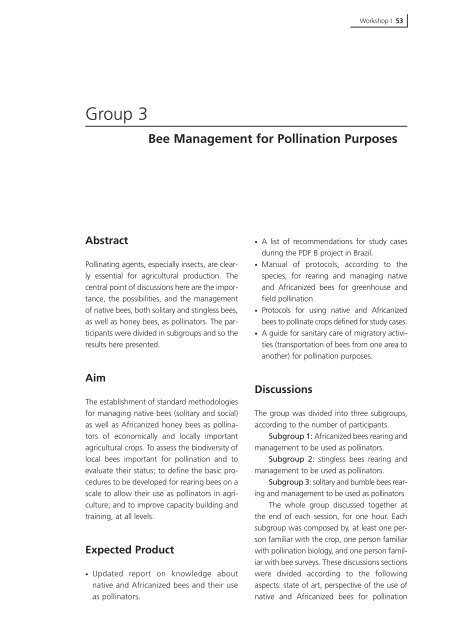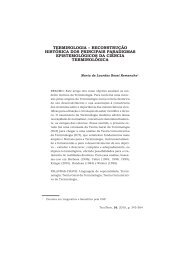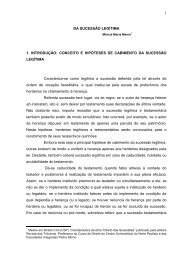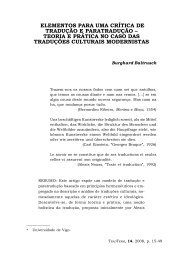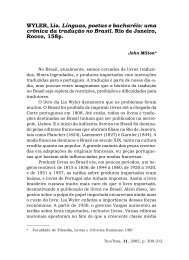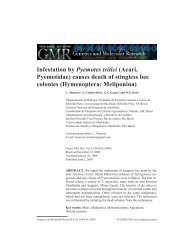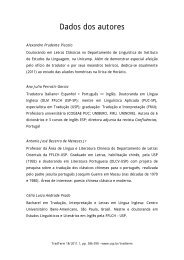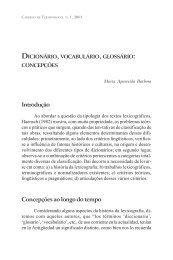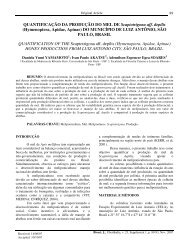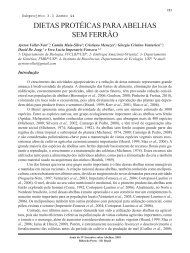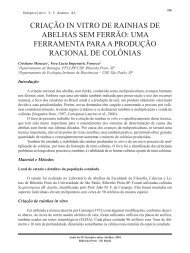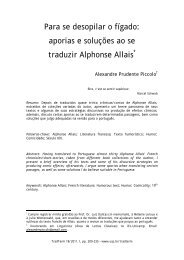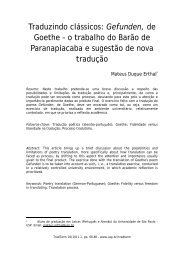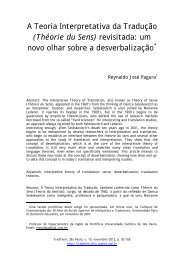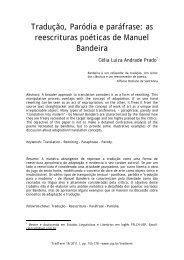Bees as pollinators in Brazil - USP
Bees as pollinators in Brazil - USP
Bees as pollinators in Brazil - USP
Create successful ePaper yourself
Turn your PDF publications into a flip-book with our unique Google optimized e-Paper software.
Group 3<br />
Abstract<br />
Poll<strong>in</strong>at<strong>in</strong>g agents, especially <strong>in</strong>sects, are clearly<br />
essential for agricultural production. The<br />
central po<strong>in</strong>t of discussions here are the importance,<br />
the possibilities, and the management<br />
of native bees, both solitary and st<strong>in</strong>gless bees,<br />
<strong>as</strong> well <strong>as</strong> honey bees, <strong>as</strong> <strong>poll<strong>in</strong>ators</strong>. The participants<br />
were divided <strong>in</strong> subgroups and so the<br />
results here presented.<br />
Aim<br />
The establishment of standard methodologies<br />
for manag<strong>in</strong>g native bees (solitary and social)<br />
<strong>as</strong> well <strong>as</strong> Africanized honey bees <strong>as</strong> <strong>poll<strong>in</strong>ators</strong><br />
of economically and locally important<br />
agricultural crops. To <strong>as</strong>sess the biodiversity of<br />
local bees important for poll<strong>in</strong>ation and to<br />
evaluate their status; to def<strong>in</strong>e the b<strong>as</strong>ic procedures<br />
to be developed for rear<strong>in</strong>g bees on a<br />
scale to allow their use <strong>as</strong> <strong>poll<strong>in</strong>ators</strong> <strong>in</strong> agriculture;<br />
and to improve capacity build<strong>in</strong>g and<br />
tra<strong>in</strong><strong>in</strong>g, at all levels.<br />
Expected Product<br />
• Updated report on knowledge about<br />
native and Africanized bees and their use<br />
<strong>as</strong> <strong>poll<strong>in</strong>ators</strong>.<br />
• A list of recommendations for study c<strong>as</strong>es<br />
dur<strong>in</strong>g the PDF B project <strong>in</strong> <strong>Brazil</strong>.<br />
• Manual of protocols, accord<strong>in</strong>g to the<br />
species, for rear<strong>in</strong>g and manag<strong>in</strong>g native<br />
and Africanized bees for greenhouse and<br />
field poll<strong>in</strong>ation.<br />
• Protocols for us<strong>in</strong>g native and Africanized<br />
bees to poll<strong>in</strong>ate crops def<strong>in</strong>ed for study c<strong>as</strong>es.<br />
• A guide for sanitary care of migratory activities<br />
(transportation of bees from one area to<br />
another) for poll<strong>in</strong>ation purposes.<br />
Discussions<br />
Workshop I 53<br />
Bee Management for Poll<strong>in</strong>ation Purposes<br />
The group w<strong>as</strong> divided <strong>in</strong>to three subgroups,<br />
accord<strong>in</strong>g to the number of participants.<br />
Subgroup 1: Africanized bees rear<strong>in</strong>g and<br />
management to be used <strong>as</strong> <strong>poll<strong>in</strong>ators</strong>.<br />
Subgroup 2: st<strong>in</strong>gless bees rear<strong>in</strong>g and<br />
management to be used <strong>as</strong> <strong>poll<strong>in</strong>ators</strong>.<br />
Subgroup 3: solitary and bumble bees rear<strong>in</strong>g<br />
and management to be used <strong>as</strong> <strong>poll<strong>in</strong>ators</strong><br />
The whole group discussed together at<br />
the end of each session, for one hour. Each<br />
subgroup w<strong>as</strong> composed by, at le<strong>as</strong>t one person<br />
familiar with the crop, one person familiar<br />
with poll<strong>in</strong>ation biology, and one person familiar<br />
with bee surveys. These discussions sections<br />
were divided accord<strong>in</strong>g to the follow<strong>in</strong>g<br />
<strong>as</strong>pects: state of art, perspective of the use of<br />
native and Africanized bees for poll<strong>in</strong>ation


